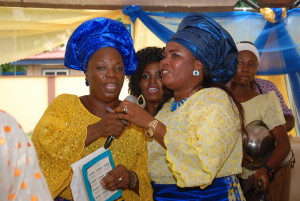A ṣe àkíyèsí pé wọn ti sọ iṣẹ́ ìyàwó-ilé di òwò nibi ìgbéyàwó ìbíl̀̀̀̀̀̀ẹ̀, pàtàki ni àwọn ilú nlá, nítorí èyí “ó ju alaga méjì tó ngbe inú ọkọ̀ bẹ ẹ. Wọn pè ìkan ni “Alaga Ìdúró” wọn pe ìkejì ni “Alaga Ijoko”. Gẹgẹbi àṣà ilẹ Yorùbá, kòsí bí “Ìyàwó ilé ti lè jẹ “Alaga” lórí ẹbí ọkọ tàbí ẹbí ìyàwó ti a ngbe. Ọkunrin ti o ti ṣe ìyàwó ti o yọri fún ọpọlọpọ ọdún, ti o si gbayí láwùjọ, yálà ni ìdílé ìyàwó tàbí ìdílé ọkọ ni a nfi si ipò “ALAGA” tàbí “OLÓRÍ ÀPÈJỌ.
Ìyàwó àgbà ni ìdílé ọkọ àti ti ìyàwó ni o ma nṣe aṣájú fún áwọn ìyàwó ilé yoku lati gbé tàbí gba igbá ìyàwó ni ibi ìgbéyàwó ìbílẹ. Ni ayé òde oni, a ṣe àkíyèsí wipé, ìdílé ìyàwó àti ọkọ, a san owó rẹpẹtẹ lati gba àwọn ti o yẹ ki a pè ni “Adarí Ètò Ijoko” fún ẹbi Ìyàwó àti “Adarí Ètò Ìdúró” fún ẹbi Ọkọ-ìyàwó”. Lẹhin ti àwọn obìnrin àjòjì yi ti gba owó iṣẹ́, wọn a sọ ara wọn di “Ọ̀GÁ”, wọn a ma pàṣe, wọn a ma ṣe bí ó ti wù wọn lati tún rí owó gbà lọ́wọ́ àwọn ẹbí mejeeji. Nípa ìwà yí, wọn a ma fi àkókò ṣòfò. Yorùbá ni “Alágbàtà tó nsọ ọjà di ọ̀wọ́n”.
“Ṣe bí wọn ti nṣe, ki o ba le ri bi o ṣe nri”, o yẹ ki á ti ọẃọ àṣàkasà yi bọlẹ̀. Ko ba àṣà mu lati sọ “Aṣojú awọn ìyàwó-Ilé” di “ALAGA”. Ipò méjèjì yàtọ sira, ó dẹ yẹ ki o dúró bẹ ẹ nítorí ọ̀gá méjì kò lè gbé inú ọkọ̀ kan.
ENGLISH TRANSLATION
It can easily be observed that Traditional marriages have turned largely commercial in nature and as a result of this there are more than two captains in such a ship. One is called “SEATING IN CHAIRMAN” while the second is called “STANDING IN CHAIRMAN”. In Yoruba culture, “a Housewife” cannot be made the CHAIRMAN over her husband’s family in either the Bride or the Groom’s Family. The Chairman in the Traditional Marriage is often an honourable man with many years of married life, carefully chosen from either the Bride or Groom’s family.
The most senior wife in both the bride and groom’s family are the ones that lead the other wives to present or receive bridal gifts from the groom’s family. In recent times, it was observed that both the bride and Groom’s Family engage these professional “Senior Wives” and they are paid handsomely for their service to moderate at such events, hence they should be referred to as “Master of Ceremony” rather than “Chairman, Bride’s Family” and “Chairman, Groom’s Family”. These women in addition to collecting their fees, they often turn themselves into “SUPERIORS”, dictating the pace and wasting time in order to rake in additional money. According to a Yoruba idiom they can be referred to as “The Middlemen inflating cost”.
It is advisable to “do things according to how it should be done”, hence it is necessary to curb this bad practice. It is not cultural to turn “the Representative of the Housewives of the Bride & Groom” to the “CHAIRMAN”. The two roles are separate and should remain separate because two masters cannot steer a ship.
Originally posted 2015-02-24 23:25:22. Republished by Blog Post Promoter




The Yoruba speaking people should be careful about originality. When a language is diluted , we miss the flavor and the culture becomes vulnerable to any type of interpretations. Yoruba is unique and should be spoken and written as such. “ODUDUWA A GBE YIN O ASE”.
Ẹ kú ọ̀rọ̀ o. Òtítọ́ gidi ni ẹ sọ o.
Ó yẹ kí a tètè wá ǹkan ṣe s’ọ́rọ̀ yìí kí àṣà Ìgbéyàwó náà tó dojúrú pátápátá.
Ọwọ́ yín ó máa ròkè o.
Ẹ ṣé púpọ̀ fún àkíyèsí yin lóri àṣà igbéyàwó òde òni pàtàki lóri àkọlé “Ọ̀gá méjì kò lè gbé inú ọkọ̀ kan”. Ẹ jẹ́ ki á pa ẹnu àti ọgbọ́n pọ̀ lati wá àtúnṣe si ibàjẹ́ àṣà àti èdè Yorùbá ti wọn ti dojú rẹ̀ rú pátápátá.